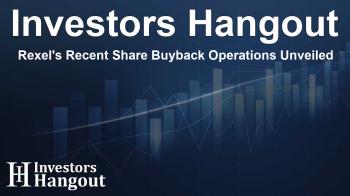Rexel's Recent Share Buyback Operations Unveiled

Rexel's Strategic Share Buybacks
Rexel, a prominent name in the electrical distribution sector, has been actively managing its own shares through strategic buybacks. This decision is a part of the broader finance and investment strategy aimed at maximizing shareholder value and enhancing market positioning. The company announced significant operations regarding its share repurchases within specific dates.
Overview of Recent Transactions
From the authorized share buybacks, Rexel initiated a series of transactions involving the purchase of its own shares. During a designated timeframe in 2025, the company disclosed details regarding these buyback operations, emphasizing transparency and compliance with applicable laws.
Share Buyback Details
During the specified dates, Rexel purchased a total of 110,648 shares. This move reflects Rexel's commitment to managing its capital actively and reinforcing investor confidence. The average purchase price was approximately €26.86, indicating a balanced approach in acquisition strategies. The company utilized various trading platforms to execute these buybacks efficiently.
Trading Platforms Used
Rexel's share purchases were primarily conducted on multiple European trading platforms. This strategic choice enables greater liquidity and supports efficient market transactions. Specifically, the shares were bought across notable markets such as AQEU, CCXE, and XPAR, solidifying Rexel’s operational reach within European markets.
Impact of the Buybacks on Shareholder Value
The decision to buy back shares generally indicates a company's strong financial position and its commitment to returning value to shareholders. By actively reducing the number of shares in circulation, Rexel can potentially increase earnings per share, which can lead to favorable market reactions and enhanced stock valuation over time. This approach not only reinforces investor trust but also positions Rexel favorably against its competitors.
Future Outlook
Looking forward, Rexel remains devoted to maintaining a robust and flexible capital structure. The share buybacks are part of a larger vision that includes optimizing resources for innovation and growth within the industry. The company aims to leverage such financial strategies to ensure long-term sustainability and profitability.
Frequently Asked Questions
What is Rexel's recent share buyback strategy?
Rexel has been actively purchasing its own shares to enhance shareholder value and demonstrate its confidence in long-term growth.
How many shares did Rexel buy back recently?
A total of 110,648 shares were repurchased by Rexel within the specified period.
What was the average price of shares bought back by Rexel?
The average purchase price for the shares was around €26.86.
Which markets were involved in the share buyback transactions?
Rexel conducted buybacks on multiple platforms, including AQEU, CCXE, and XPAR, enhancing trading efficiency.
What does this mean for Rexel's future?
The share repurchase strategy signals Rexel's strong financial health and commitment to maximizing shareholder returns, positively affecting its market position.
About The Author
Contact Henry Turner privately here. Or send an email with ATTN: Henry Turner as the subject to contact@investorshangout.com.
About Investors Hangout
Investors Hangout is a leading online stock forum for financial discussion and learning, offering a wide range of free tools and resources. It draws in traders of all levels, who exchange market knowledge, investigate trading tactics, and keep an eye on industry developments in real time. Featuring financial articles, stock message boards, quotes, charts, company profiles, and live news updates. Through cooperative learning and a wealth of informational resources, it helps users from novices creating their first portfolios to experts honing their techniques. Join Investors Hangout today: https://investorshangout.com/
The content of this article is based on factual, publicly available information and does not represent legal, financial, or investment advice. Investors Hangout does not offer financial advice, and the author is not a licensed financial advisor. Consult a qualified advisor before making any financial or investment decisions based on this article. This article should not be considered advice to purchase, sell, or hold any securities or other investments. If any of the material provided here is inaccurate, please contact us for corrections.

